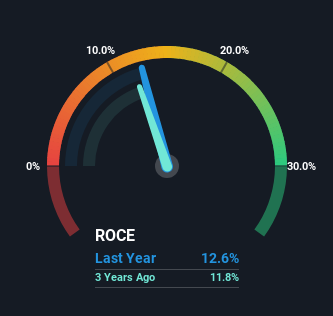Guan Chong Berhad (KLSE:GCB) May Have Issues Allocating Its Capital
If we want to find a potential multi-bagger, often there are underlying trends that can provide clues. One common approach is to try and find a company with returns on capital employed (ROCE) that are increasing, in conjunction with a growing amount of capital employed. This shows us that it's a compounding machine, able to continually reinvest its earnings back into the business and generate higher returns. However, after briefly looking over the numbers, we don't think Guan Chong Berhad (KLSE:GCB) has the makings of a multi-bagger going forward, but let's have a look at why that may be.
Understanding Return On Capital Employed (ROCE)
Just to clarify if you're unsure, ROCE is a metric for evaluating how much pre-tax income (in percentage terms) a company earns on the capital invested in its business. To calculate this metric for Guan Chong Berhad, this is the formula:
Return on Capital Employed = Earnings Before Interest and Tax (EBIT) ÷ (Total Assets - Current Liabilities)
0.13 = RM338m ÷ (RM6.1b - RM3.5b) (Based on the trailing twelve months to March 2024).
Therefore, Guan Chong Berhad has an ROCE of 13%. On its own, that's a standard return, however it's much better than the 6.9% generated by the Food industry.
See our latest analysis for Guan Chong Berhad

In the above chart we have measured Guan Chong Berhad's prior ROCE against its prior performance, but the future is arguably more important. If you'd like, you can check out the forecasts from the analysts covering Guan Chong Berhad for free.
How Are Returns Trending?
When we looked at the ROCE trend at Guan Chong Berhad, we didn't gain much confidence. Over the last five years, returns on capital have decreased to 13% from 30% five years ago. However, given capital employed and revenue have both increased it appears that the business is currently pursuing growth, at the consequence of short term returns. And if the increased capital generates additional returns, the business, and thus shareholders, will benefit in the long run.
Another thing to note, Guan Chong Berhad has a high ratio of current liabilities to total assets of 56%. This can bring about some risks because the company is basically operating with a rather large reliance on its suppliers or other sorts of short-term creditors. While it's not necessarily a bad thing, it can be beneficial if this ratio is lower.
The Bottom Line On Guan Chong Berhad's ROCE
While returns have fallen for Guan Chong Berhad in recent times, we're encouraged to see that sales are growing and that the business is reinvesting in its operations. And the stock has done incredibly well with a 129% return over the last five years, so long term investors are no doubt ecstatic with that result. So while investors seem to be recognizing these promising trends, we would look further into this stock to make sure the other metrics justify the positive view.
Guan Chong Berhad does have some risks, we noticed 3 warning signs (and 2 which are concerning) we think you should know about.
While Guan Chong Berhad isn't earning the highest return, check out this free list of companies that are earning high returns on equity with solid balance sheets.
New: Manage All Your Stock Portfolios in One Place
We've created the ultimate portfolio companion for stock investors, and it's free.
• Connect an unlimited number of Portfolios and see your total in one currency
• Be alerted to new Warning Signs or Risks via email or mobile
• Track the Fair Value of your stocks
Have feedback on this article? Concerned about the content? Get in touch with us directly. Alternatively, email editorial-team (at) simplywallst.com.
This article by Simply Wall St is general in nature. We provide commentary based on historical data and analyst forecasts only using an unbiased methodology and our articles are not intended to be financial advice. It does not constitute a recommendation to buy or sell any stock, and does not take account of your objectives, or your financial situation. We aim to bring you long-term focused analysis driven by fundamental data. Note that our analysis may not factor in the latest price-sensitive company announcements or qualitative material. Simply Wall St has no position in any stocks mentioned.
Have feedback on this article? Concerned about the content? Get in touch with us directly. Alternatively, email editorial-team@simplywallst.com
About KLSE:GCB
Guan Chong Berhad
An investment holding company, produces, processes, markets, and sells cocoa-derived food ingredients and cocoa products in Malaysia, Singapore, Indonesia, Germany, and internationally.
Fair value with acceptable track record.
Market Insights
Community Narratives




